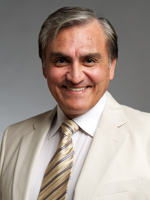How Guido Wilfred Lopez, PhD, is changing the world through research and teaching
The idea of hydrogen as a fuel for vehicles has fascinated and frustrated scientists and engineers for years. It’s plentiful, clean, and three times more powerful than gasoline – but complicated and expensive to obtain. If someone could figure out a simple and affordable way to derive hydrogen from water, it would change the world.

Students in the Bachelor’s in Mechanical Engineering Technology program at the College of Professional Studies are learning from someone working to do just that – faculty member, Fred Lopez. Dr. Lopez recently taught Introduction to Systems in Static Equilibrium, Application of Static Equilibrium, Introduction to Stress Analysis and Application of Stress Analysis.
“There are many methods for getting hydrogen,” says Dr. Lopez. “They’re just not cost-competitive as an energy source. I’m working with scientists at the Russian Academy of Science on a solution that uses nanotechnology. We’ve demonstrated that the technology is viable and cheaper than other methods.”
Dr. Lopez believes his energy research work contributes to how he teaches his classes and how his students learn. “You have to learn by doing things – that’s the essence of engineering,” he says. As essential as hands-on learning is the understanding that engineers play a key role in society, and like Dr. Lopez, may spend decades pursuing ideas and progressing through trial and error.
“Engineers are the ones who create technology and advance civilization,” he says. “I make it clear to my students that they will be the ones called to develop these technologies in the future. They have to be able to continue the work.”